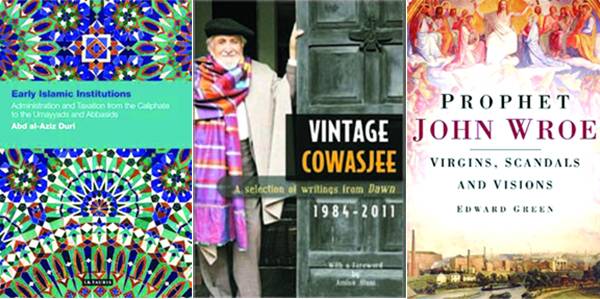
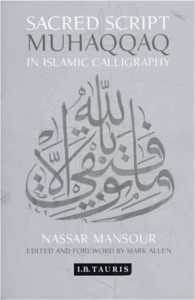
Sacred Script Muhaqqaq in Islamic Calligraphy
Nassar Mansour
I B Tauris (hardcover), 2011
PRs 10,700
Arabic calligraphy is at once an expression of piety, aesthetic sensibility and artistic discipline. Muhaqqaq was an early term which captured care, clarity and meticulousness in calligraphy. It was associated with the making of manuscripts of the Qur’an — a sacred task and one which helped to give the new Islamic order both identity and coherence. Muhaqqaq energed in the eleventh century as the name for one of six classical scripts. This is the first book devoted entirely to Muhaqqaq tradition.
Nassar Mansour, himself a highly respected calligrapher, here traces the development of Muhaqqaq. His book also presents examples of his own work in Muhaqqaq whish demonstrate the enduring value of this script for today. This is an invaluable and beautifully executed reference work on Islamic calligraphy, which will attract art historians and practitioners alike.
About the Author
Nassar Mansour is one of the most accomplished calligraphers in the Arab World today. He trained in Istanbul under the eminent calligrapher Hasan Celebi and, between 1977 and 1999, he was responsible for calligraphy and ornamentation in the restoration of the twelfth-century pulpit (mimbar) of Saladin at the Al Aqsa Mosque in Jerusalem after it was destroyed in 1969. He completed his PhD, on which this book is based, in 2007. He has participated in numerous calligraphy workshops and exhibitions in the Middle East, Europe, India, Malaysia and Japan and his work is represented at the British Museum. Mansour lives in Jordan, where he teaches at the Institute of Traditional Islamic Arts and Al Baqa Applied University.
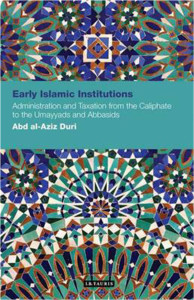
Early Islamic Institutions
Abd al-Aziz Duri
I B Tauris (hardcover), 2011
PRs 10,060
The rapid expansion of the early Islamic world is conventionally ascribed to a combination of brilliant military leadership and religious fervor. In this book, Abd al-Aziz Duri demonstrates how the growth, development and durability of early Islamic governance derived from highly sophisticated systems of administration (in which the idea of a Muslim ummah was the central feature) as well as efficient mechanisms for taxation and tax collection. The fact that in a highly dynamic period of Islamic history a seamless system of administration could endure for several centuries, from the early Muslim conquests and the later Umayyad era to the end of Abbasid rule, is testimony to the political and organizational skills of these early Muslim leaders. Duri’s work makes a major contribution to our understanding of how Islam established itself and flourished as a lasting major force in the development of world history.
About the Author
Abd al-Aziz Duri (1919-2010) was Professor of History at the University of Jordan, having previously served as President of Baghdad University from 1963 to 1968. Among the most influential of his books that also marked a point of departure was his The Economic History of Iraq in the Fourth Century AH (1948), which established a new sphere of emphasis in Arab studies in the field. Duri would go on to contribute seminal works in Arab- and Islamic history including Studies in the Late Abbasid Period (1945), An Introduction to the History of the Dawn of Islam (1949), and The Early Abbasid Period (1988) as well as a critical analysis of Arab historiography itself in Research into the Origins of the Discipline of History among the Arabs (1960). He would also author treatises on Arab nationalism such as The Historical Roots of Arab Nationalism (1960) and The Historical Formation of the Arab nation: A Study in Identity and Consciousness (1987).
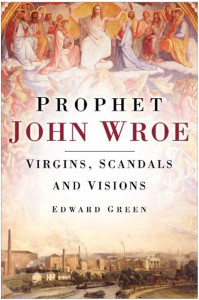
‘Prophet’ John Wroe: Virgins, Scandals and Visions
Edward Green
Sutton (hardcover), 2005
PRs 1,425
‘Prophet’ John Wroe (1782-1863), found fame through his many predictions, his preaching and the establishment of the Christian Israelite Church in the early 1820s. Under Wroe the Christian Israelites were surrounded by scandal and controversy. The best known of these is when Wroe publicly announced that he had received orders from heaven that seven virgins should be delivered to him to ‘comfort and cherish him’. As might be expected, the girls did not remain virgins for long. Everywhere Wroe went scandal followed, whether financial or sexual, with extravagant building projects, including his own mansion, Melbourne House near Wakefield, forcing many of the sect’s members into the workhouse. Edward Green is the first person to research Wroe’s life and career in depth and to place him in the context of an industrialised society struggling to find values and needing to believe in themselves as the Chosen People. Using the original testimonies of many of those involved in the scandals surrounding Wroe his book is a celebration of a rich, if eccentric, tradition where religion, sex, politics and money struggle for possession of the nation’s soul.
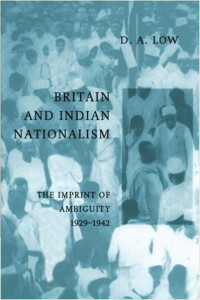
Britain and Indian Nationalism:
The Imprint of Ambiguity 1929-1942
D A Low
Cambridge (hardcover), 1997
PRs 8,000
India’s struggle for independence was arguably the most momentous of the twentieth century, and central to it was the generation of powerful nationalist forces. In a series of detailed studies Anthony Low shows how the ambiguity of the British position conditioned the distinctive character of this struggle: how the British determination to hold fast their Indian empire (unlike the Americans in the Philippines) prior to 1942 was nonetheless complemented by a reluctance to resist their nationalist opponents in the unyielding ways of the French in Vietnam and the Dutch in Indochina. Much that Gandhi did, Professor Low concludes, would have been unnecessary in the Philippines and impossible in Indonesia and Vietnam, but astutely fitted the peculiar conditions of the nationalist struggle against the British in India. Published on the fiftieth anniversary of Indian independence, Britain and Indian Nationalism makes a major contribution to the historiography of modern India, to Britain’s relations with its empire, and to the history of decolonisation in the twentieth century.
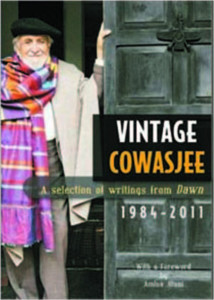
Vintage Cowasjee: A Selection of Writings from Dawn
Foreward by Amina Jilani
Sama (paperback), 2014
PRs 1,200
Vintage Cowasjee is a selection of some 200 columns from the writings of Ardeshir Cowasjee that have appeared in Dawn over the past twenty-plus years. Focusing on issues as diverse as politics, environment, human rights, judiciary, Karachi, his friends and other personalities he has known, these articles are as pertinent today as they were when they were first written. They offer a record for our times and for all that ails the country. For easy reference, the work has been divided into sections and is a representation of the work of the columnist depicting some of the issues that he held especially close. This book will remain a source of reference for all interested in Pakistan and a reminder of the work done by a tireless and indefatigable campaigner working towards what he believed to be right.

